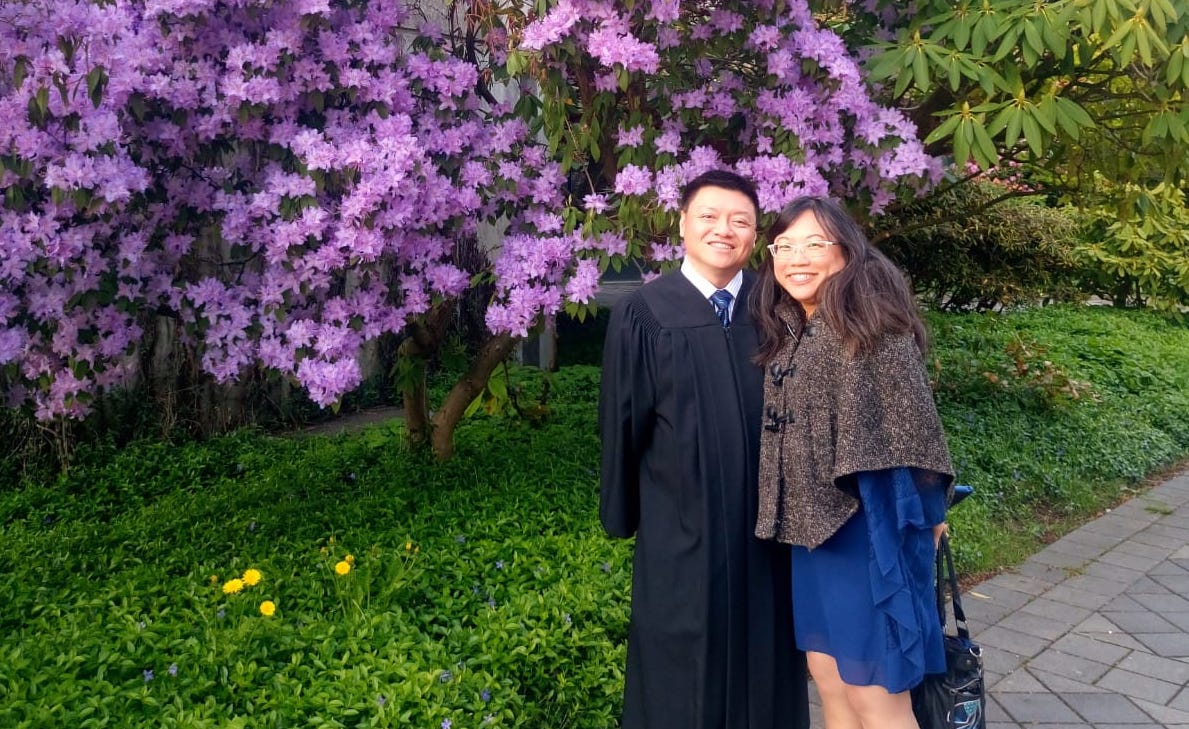
Michael Low, an ex-lawyer and banker, with his wife Elena Low at Regent College, a theological school in Canada. All photos courtesy of Michael Low.
Michael Low was a young lawyer who led two distinct lives.
For weekday-Michael, working in a high-stress environment, smoking and filthy language amongst colleagues was part of the package. “If you had seen me in the office, it’d be difficult to imagine that anyone would know I was a Christian.”
But Sunday-Michael was different: He led worship in church and generously opened his house for cell group gatherings on Friday nights.
Low had become a Christian during his time in St Andrews Junior school. In university, Low joined Cru (formerly known as Campus Crusade), where he experienced his first vibrant season of growth. But soon after transiting into working life as a lawyer, Low lost touch with his mentor and the Cru community.
His work environment soon became the defining influence in his life even though he still attended church regularly.
“It was really weird – and a big struggle internally.”
He knew, instinctively, there was something very wrong.
When work becomes toxic
Low and his wife seldom attended cell group even though they hosted the group in their home.
His work environment soon became the defining influence in his life even though he still attended church regularly.
“We both had crazy hours, so I gave them the keys to our house to have cell. Most of the time, I was home in time to say goodbye to people.”
One Friday, Low made it back in time for cell group. “This was one of the rare occasions – I just happened to be able to make it.”
Low, now 47, pointed out: “You can kind of see, God wanted me there.”
That night, the group was having a simple sharing session when Low’s cell group leader asked: “Are we living our best lives for God?”
“Clearly, I’m not at this point,” Low recalled thinking.
Low soon decided: He needed to leave the toxic environment that was influencing his lifestyle and behaviour. Even then, Low struggled for a year.
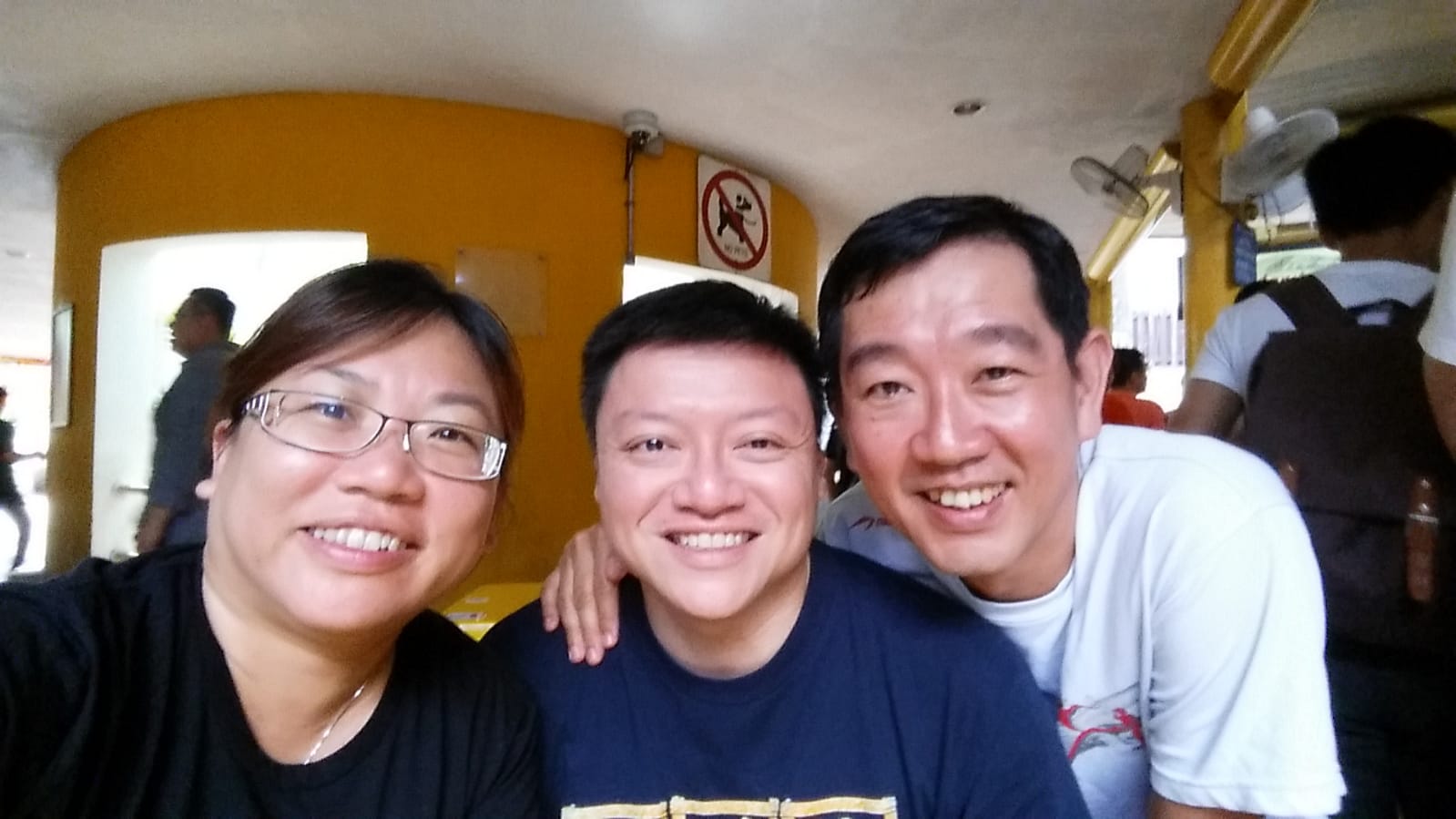
Lam Kok Hiang (right) with Michael (centre) and Elena before the couple left Singapore in 2015. Lam Kok Hiang, who is still with Cru, was Michael’s mentor in law school.
He had only been in this career for as long as he had spent in law school – was he really supposed to go? Things did not make sense. Surely there had to be a mistake?
Low eventually did leave, but even as he recounted his thought process, Low said: “Looking back, I might have done things differently. At that point in time, with a limited maturity, the obvious thing was to leave the environment.”
A lingering “but”
After spending a break of three months praying and seeking God, Low came to know of his next job through a most unlikely source: He was approached by a church friend who asked if he would like to take over her role as a professional trustee at a bank.
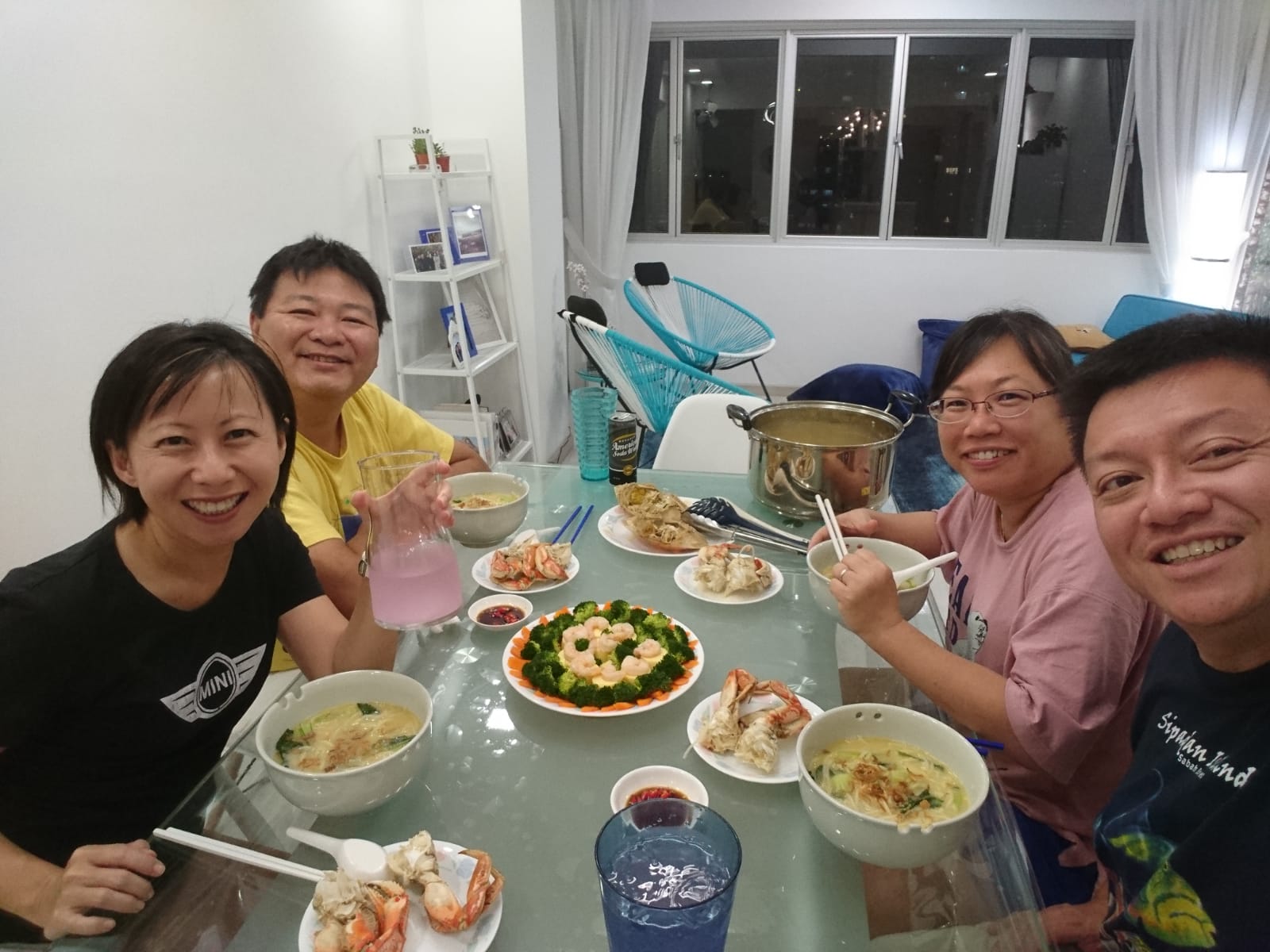
Michael (right) and Elena with their best friends having dinner at Michael’s home. An avid cook, Michael spent a lot of time cooking during his three-month sabbatical. In 2002, the couple were hosting a dinner just like this when his friend offered him her job in banking.
She was looking to leave and, as a favour to her boss, was helping to find her own replacement.
Low ended up enjoying the job so much that he stayed in that role for 15 years with different banks.
“To be a trustee is essentially to look after other people’s things; to make sure they are kept safe and handed on to the next generation,” Low explained.
In the beginning, despite how much Low enjoyed the work, he could not reconcile the purpose of his work with his newly re-prioritised beliefs about God and His work. “I’m looking after money for rich people; how does this help the Kingdom? Am I just here to work and make money to support the Kingdom?”
“I had this sense of, ‘Yeah I like what I do, but.’ There was this big ‘but’. I couldn’t understand why. You know something is wrong but you can’t quite put your finger to it.”
He did not know about the theology of work – God-ordained logic and principles to guide and inform how and why man works – much less understand how his work fit into “Kingdom” work.
For such a time as this
As he sought meaning while he worked, however, Low recognised God’s hand of Providence along the way.
“Meekness is strength under control – you don’t let yourself be pushed over, nor do you roll over, or push other people over.”
In one such incident, Low explained how he was able to connect a pastor with one of his clients, a Christian family whose charitable trust he managed.
“That was an ‘Esther moment’ for me, I had a sense of being there ‘for such a time as this’,” Low says, referring to his being there in the right place, amongst the right people, at the right time (Esther 4:14).
It took a few years, but he soon came to understand that his job as a trustee taught him what it really meant to be a steward, “which actually has a very deep kingdom mentality to it”.
He did not have the vocabulary to express it then, but Low had an innate sensing of what stewardship, and even role modelling, looked like.
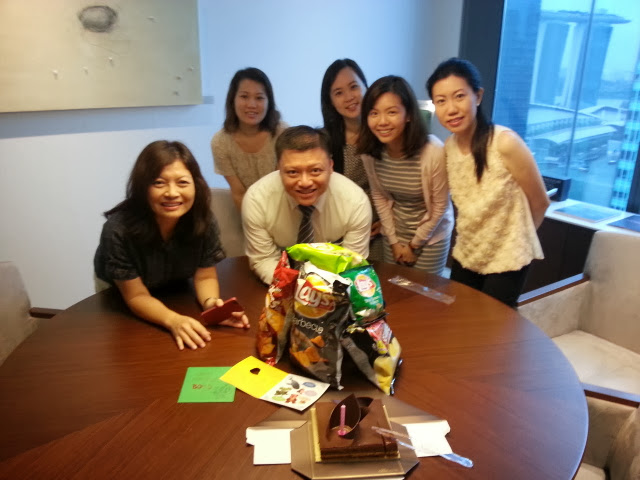
Michael with the last team he led in the bank before leaving for Bible school. His team bought all his favourite snacks to celebrate his birthday. As Michael continued to grow in the faith, he realised that leading a team was a form of stewardship as well, not merely assets, but lives.
The breakthrough came in the form of a book, The Other Six Days: Vocation, Work and Ministry in Biblical Perspective, by Paul Stevens.
“There was this whole new way of thinking about work and the Kingdom and what it actually means,” said Low. “I realised that for most of my life this was what I had been searching for.”
His curiosity piqued, Low started digging deeper into the theology of work where he found startling truths about work in the Bible that was “liberating”.
Speaking a little faster, Low mentions how Stevens explains that the Bible never talks about work just for the means, but rather, about work being good in itself.
“Work started even before the Fall, when God created Adam and Eve and the Garden. (Genesis 2:15)
“God told them they needed to work – just that work was pleasurable then, and after the Fall, work was hard.
“Again, that was something I had never paid attention to,” Low added.
Eventually, his search led him to Bible school at Regent College in Vancouver, Canada.
“In many ways it was crazy. I was at the peak of my career.”
But going to Regent was a game changer. “It helped me to finally recognise that what I was doing at work was important to God!”
Low explained: “Not just the fact that it was a job that I had, to be able to support ministries and all those other things. But to me, I finally developed a sense of who I was made to be.”
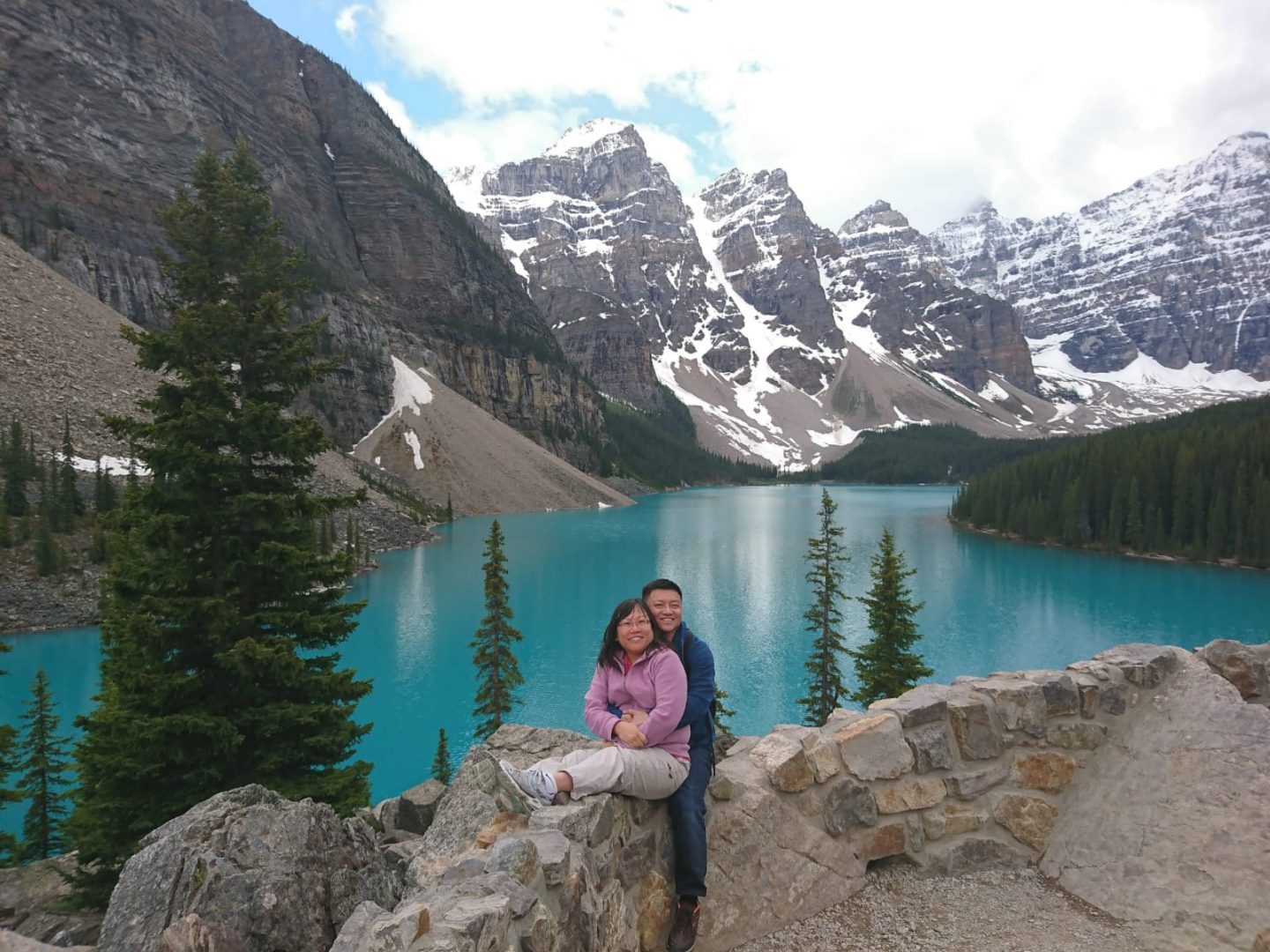
Michael and Elena on a hike in Canada. Michael said: “We really enjoyed that time together. We never had such space and time to spend together, in a place where you can’t ignore God.”
In his years of working as a banker, it had never occurred to him that his personality and disposition were uniquely suited to his role as a trustee – something that God had already prepared in advance for him.
“And God has a sense of humour – trust law was the area I hated most in law school!”
The meaning of meekness
But it is not just an inward-focused change. As he reflected on his journey, Low, now 47, shared about how his view of office politics has changed.
He used to avoid office politics like the plague. “I generally tried to stay clear of turf wars and people trying to build their own kingdoms. I’d say, ‘Forget it, I’m not involved, this doesn’t concern me.’”
“Those who invest their hope in an unseen world prove it by their actions in this world.”
Low said: “I realise taking myself out of the picture is a choice in itself. When I do that, my team doesn’t have a voice. And a lot of times, the things that came down ended up affecting them much more than me.
“The people who suffered for that was not me, it was my team.”
Now, however, Low sees that he should have spoken up when he was a part of the conversation. “Politics in itself is not necessarily bad,” he said. “It is just part of the realm of the broken world we live in. And there are ways to navigate it without causing harm to others.
“This was probably a prime example of what it would have meant to be meek. Meekness is strength under control – you don’t let yourself be pushed over, nor do you roll over, but neither do you have to push other people over.”
Since coming back to Singapore, Low has taken up a role as Advancement Consultant with reSource Leadership International, leveraging upon his experience and networks to help communicate and grow the vision of building Christian leaders all over the world.
Philip Yancey, in his book Rumours of Another World, wrote: “Those who invest their hope in an unseen world prove it by their actions in this world.”
And it is clear that, even amidst lingering doubt and future uncertainty, Low, whose life verse is Genesis 12:2, knows that he has been blessed to be a blessing and is determinedly headed in the direction of God’s Kingdom.
We are an independent, non-profit organisation that relies on the generosity of our readers, such as yourself, to continue serving the kingdom. Every dollar donated goes directly back into our editorial coverage.
Would you consider partnering with us in our kingdom work by supporting us financially, either as a one-off donation, or a recurring pledge?
Support Salt&Light



